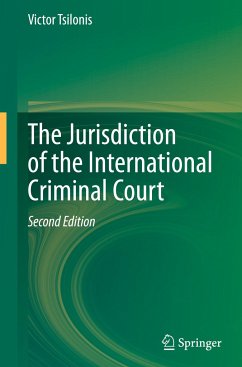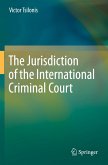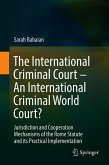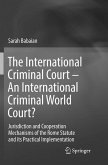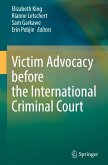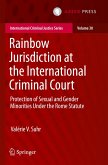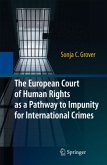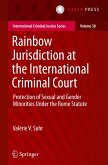This book embarks on a comprehensive exploration of the jurisdiction of the International Criminal Court (ICC) and elucidates the three foundational aspects of its jurisdiction as laid out in the Rome Statute: the preconditions for exercising jurisdiction (Article 12 ICCRSt), its substantive competence regarding core crimes (Articles 5-8bis ICCRSt), and the principle of complementarity (Article 17§1(a) ICCRSt).
This principle, crucial to understanding the ICC's 'ultimate jurisdiction', is invoked only when a State Party demonstrates an inability or unwillingness to genuinely undertake investigation or prosecution. The book further probes the 'negative preconditions' of the Court's jurisdiction, in particular, immunities (Article 27 ICCRSt) and exceptions through Security Council referrals (Articles 13(b) and 15 ICCRSt).
Intended for students, scholars, and practitioners alike, this second edition offers invaluable insights into the ICC's jurisdiction, making a notable contribution to the existing literature. Importantly, it also navigates emerging fields of international criminal law, addressing topical and thought-provoking subjects such as ecocide, cyber warfare, automated lethal weapons, artificial intelligence, and the legal complexities arising from the Russian invasion of Ukraine.
Winner of the Second International Science Prize 2024 of the Hans Günter Brauch Foundation for Peace and Ecology in the Anthropocene (HGBS) on the Theme: Ecocide: Impacts of Wars and/or Climate Change on Food Security Since 1945.
Hinweis: Dieser Artikel kann nur an eine deutsche Lieferadresse ausgeliefert werden.
This principle, crucial to understanding the ICC's 'ultimate jurisdiction', is invoked only when a State Party demonstrates an inability or unwillingness to genuinely undertake investigation or prosecution. The book further probes the 'negative preconditions' of the Court's jurisdiction, in particular, immunities (Article 27 ICCRSt) and exceptions through Security Council referrals (Articles 13(b) and 15 ICCRSt).
Intended for students, scholars, and practitioners alike, this second edition offers invaluable insights into the ICC's jurisdiction, making a notable contribution to the existing literature. Importantly, it also navigates emerging fields of international criminal law, addressing topical and thought-provoking subjects such as ecocide, cyber warfare, automated lethal weapons, artificial intelligence, and the legal complexities arising from the Russian invasion of Ukraine.
Winner of the Second International Science Prize 2024 of the Hans Günter Brauch Foundation for Peace and Ecology in the Anthropocene (HGBS) on the Theme: Ecocide: Impacts of Wars and/or Climate Change on Food Security Since 1945.
Hinweis: Dieser Artikel kann nur an eine deutsche Lieferadresse ausgeliefert werden.
"Consequently, this is one of the first monographs amid the abundant literature on the International Criminal Court that attempts to examine the breadth and depth of the issues raised in relation to the preconditions for exercising the jurisdiction of the International Criminal Court (Article 12 ICCRSt) and the principle of complementarity, taking into account the 'ubiquitous' factor of international politics as well as contemporary historical data and evidence that are often ignored or overlooked, such as the internal circulars of the ICC Prosecutor's Office... The work of Victor Tsilonis, a very promising new scholar, fills a significant gap in the literature and opens up new pathways in the field of Public International Law."
Nestor Courakis , Emeritus Professor at the University of Athens
Nestor Courakis , Emeritus Professor at the University of Athens

